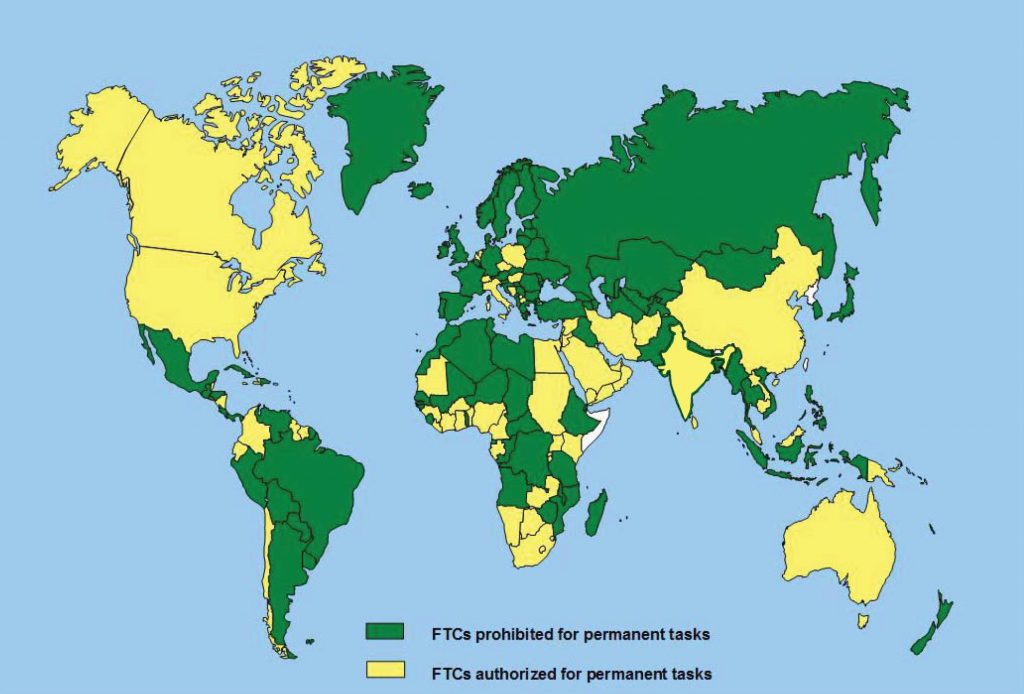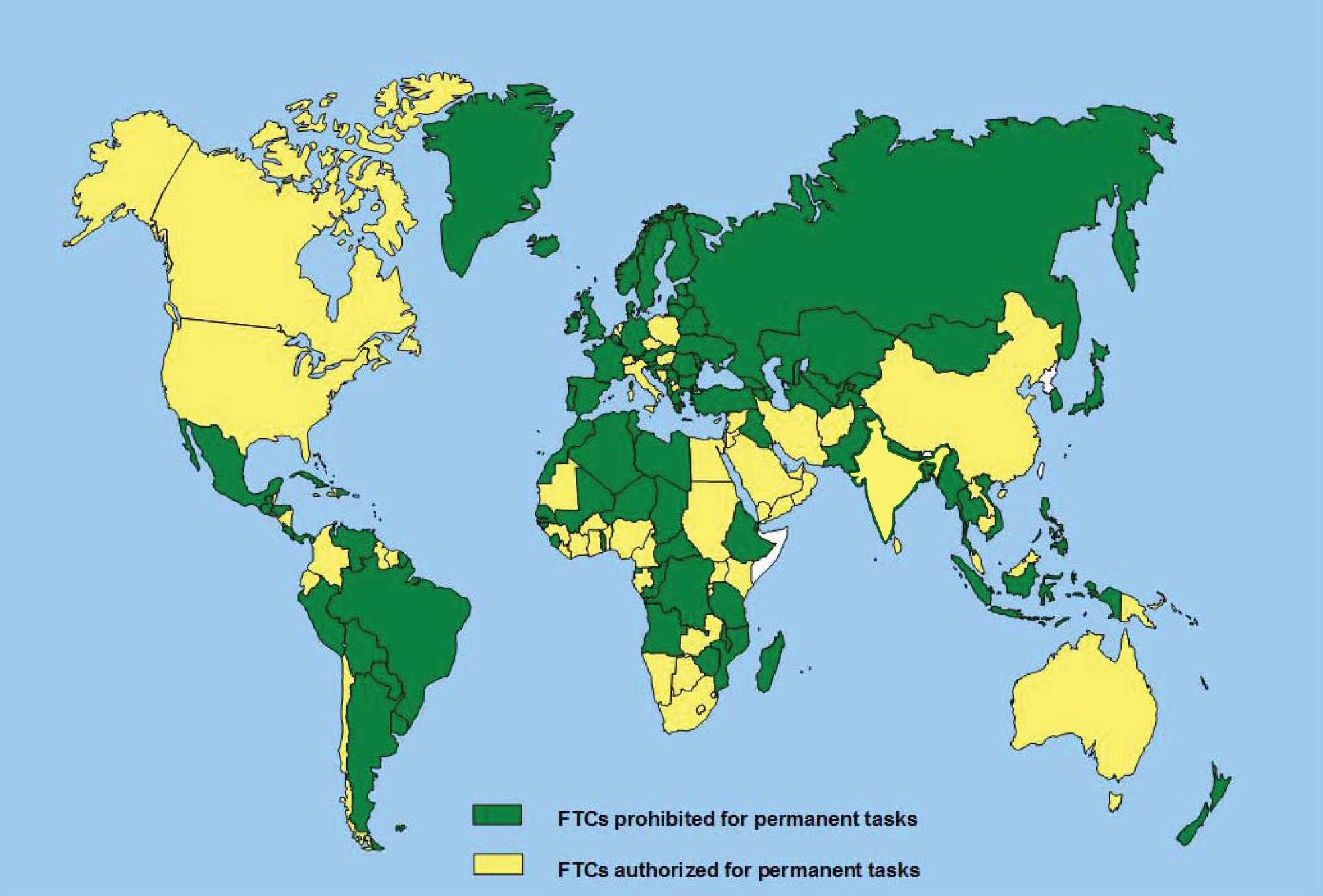In yet another effort by the government at the centre to boost Ease of Doing Business in the country and specifically to provide flexibility to employers to hire and fire at will, has extended fixed-term contracts to all sectors, beyond the apparel industry where they first introduced it. This move will allow employers to hire workers for short-term assignments and terminate their services when projects are completed.
Fixed term contract was first introduced by the NDA government in 2003. In the face of continuous opposition and countrywide protest, the UPA government retracted the amendment through a gazette notification in 2007.
The BJP government reintroduced it in the apparel sector in February 2016. In December 2017, FTC was extended to the leather and footwear industries. The government in the budget statement 2018 claims that this will result in ‘employment generation’ and hence must be extended to all sectors.
The rationale for governments for introduction of FTCs across the world have been the following:
- Nature of the Contract: (i) When employers need to temporarily replace an absent employee, for example, during maternity leave, medical leave etc.; (ii) During training or skilling; or (iii) During probation.
- Nature of the Work: (i) When the work is casual in nature; (ii) When the work is seasonal in nature; or (iii) When there is a temporary increase in work pressure in the establishment
- Nature of the Task – for example, in construction, when the work itself is based on contracts.
However, though this is the rationale for introduction, this is not how it is implemented. FTCs are being used to replace permanent workers, in permanent jobs as a mean to bypass protection of workers under labour laws. It is used to break unions. It is used as a threat to create an atmosphere of fear among the most vulnerable workers, especially migrant workers, women workers. It also in many cases has led to sexual harassment of women workers across the world as women find themselves more vulnerable under such contracts.
What is the problem with a Fixed Term Contract?
As per the Industrial Employment (Standing Orders) Central (Amendment) Rules, 2018, a “fixed term employment workman is a workman who has been engaged on the basis of a written contract of employment for a fixed period”.
What the amendment to the Standing Orders Rules mean:
1. An employer can hire as many workers under the FTC (upto 100% of the workforce) with no restriction on the nature of employment, whether perennial or not.
2.Employers can keep these workers continuously working at the establishment as long as they wish, by renewing contracts. No worker will be able to seek regularization after 240 days of working in the same establishment under the Contract Labour Act, even if they work longer.
3.Wages and benefits of the workers will remain at the entry level forever as workers will not be able to claim experience at work.
4.Workers will become more vulnerable as this amendment takes away the right to appeal of workers, which is in violation of the constitutional right of workers as citizens to redressal.
FTCs thereby institutionalise hiring and firing at will. The expiry of a fixed term contract does not constitute termination by the employer. It is a termination by operation of law. Hence the employer can no longer be held responsible for the termination of a worker.
Along with this, the proposed amendments in the Contract Labour (Regulation and Abolition) Act, 1970 attempt to exempt principal employers from all responsibility of contract workers employed in their establishment. According to the proposed amendment the contract workers will be now considered the responsibility of the contracting company. Further, contractors can now get temporary work contracts even if they do not meet the minimum requirements. They would be required to fulfill those requirements within a given period. The changes are steadily being introduced, such that Fixed term contracts for short term periods that do not conform to minimum requirements could be allowed in law to work that will make workplaces more unsafe and precarious.
The nature of the job of a worker hired under a FTC will always remain temporary. With every new contract, the worker will have to go through the same cycle of getting the job, going through probation and be paid at the entry level wage rate, without ever reaching the stage of receiving retirement benefits. Thus workers will always be tied to a vicious cycle of insecurity and this will also affect how they respond to workplace conditions.
If unionizing contract workers was difficult, unionisation of workers under FTCs will be worse. Workers under FTCs will be scared to join unions in fear of not being rehired. Without unions, employers will have a free hand in determining workplace conditions and benefits. Wages will remain at entry level giving employers a pool of skilled workers at entry level wage without the capacity to bargain for better wages and conditions for themselves.
Is there any Framework for Protection of Workers under FTCs across the World?
The Termination of Employment Convention, 1982 (No. 158) and the Termination of Employment Recommendation, 1982 (No. 166) are the key ILO standards that provide regulatory guidance on FTCs.
The ILO Convention and Recommendation lays out a framework of legal rules that member nations may adopt to prevent any abusive use of FTCs. The key recommendations being: (i) limiting the period of time for employing workers under FTCs such that the employment relationship does not become one of indeterminate duration; (ii) non-discrimination in wages and benefits between permanent workers and workers under FTCs; and (iii) deeming contracts for a specified period of time, when renewed on one or more occasions, to be permanent contracts.
As an example of regional regulatory framework, the EU Council Directive forbids employers to treat FTC workers less favourably than permanent workers unless ‘justified on objective grounds’. It also requires governments to put in place one or more of the following limits: (i) requiring objective reasons for renewal; (ii) setting a maximum total duration of renewals; (iii) setting a permitted number of renewals.
The Map here (Source: ILO) gives an idea of how FTCs are used across the world and the table below gives the maximum legal duration of FTCs is some countries:

| Maximum duration of FTCs, including Renewals | Countries |
| 1 year and less | Chile, Pakistan, Venezuela, Zimbabwe |
| 2 years | Bolivia, Brazil, Cambodia, France, Germany, South Korea, Netherlands, Spain, Sweden, Thailand |
| 3 years | Belgium, Cuba, Greece, Indonesia |
| 4 years | Germany (for Start Up Companies), Saudi Arabia, Libya, Norway, Tunisia, UAE, UK |
| 5 years | Argentina, Bahrain, Costa Rica, Finland, Hungary, Japan, Kuwait, Jordan, Paraguay, Peru, Qatar, Russian Federation, Syria |
| 6 years | Mozambique, Portugal, Vietnam |
| 10 years | China, Switzerland |
| No legal Limit | Afghanistan, Australia, Bangladesh, Canada, Denmark, Egypt, Ethiopia, Gambia, Ghana, India, Iran, Iraq, Israel, Kenya, Malaysia, Mexico, Nepal, New Zealand, Nigeria, Philippines, Poland, Singapore, South Africa, Sri Lanka, Turkey, USA |
Comparative overview of national labour laws show that different countries across the world have broadly adopted the following safeguards to prevent abuse of FTCs by employers:
(i) Prohibition of FTCs for jobs of perennial nature.
(ii) Limitation on the number of successive FTCs.
(iii) Limitation on the cumulative duration of the FTCs.
Unfortunately, the amendment to the Standing Orders introducing FTCs in all employments, does not take into consideration any of the three above safeguards.

